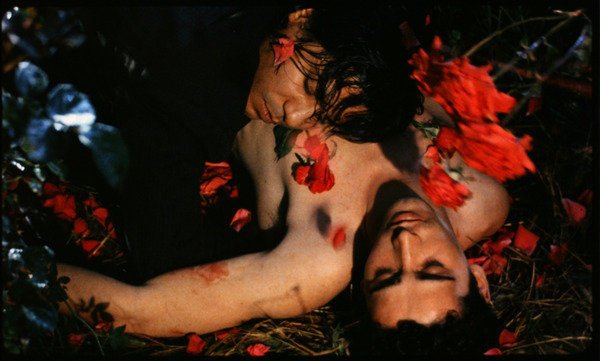Werner Schroeter
dal 10/5/2012 al 10/6/2012
Segnalato da
10/5/2012
Werner Schroeter
The Museum of Modern Art - MoMA, New York
The first comprehensive North American retrospective of German film, theater, and opera director Schroeter features 40 films and rare early experimental shorts. Making no distinction between kitsch and high art and inspired by the divas of silent-era cinema, he strove for an authenticity of feeling through extreme emotions, reaching a point, he said, of 'musical and gestural excess'.

NEW YORK, April 12, 2012—The Museum of Modern Art, in association with the Munich Film
Museum and the Goethe-Institut New York, presents the first comprehensive North American
retrospective of German film, theater, and opera director Werner Schroeter (1945-2010). Running
May 11–June 11, 2012, in The Roy and Niuta Titus Theaters, Werner Schroeter includes 40
feature films and rare early experimental shorts, very few of which have had theatrical releases in
the United States. This exhibition is organized by Stefan Droessler, Director, Munich Film Museum,
and Joshua Siegel, Associate Curator, Department of Film, The Museum of Modern Art.
Presented in association with the Goethe-Institut New York.
The full measure of Schroeter’s influence on his German contemporaries, Rainer Werner
Fassbinder, Rosa von Praunheim, and Hans-Jurgen Syberberg, and on Daniel Schmid, Ulrike
Ottinger, Wim Wenders, and Werner Herzog, has only begun to be fully appreciated. So too his
direction of actors like Isabelle Huppert, Bulle Ogier, Candy Darling, and his muse and superstar
Magdalena Montezuma, from whom he drew some of their greatest performances. Inspired, like
Jack Smith, by the divas of silent-era cinema, Schroeter strove for an authenticity of feeling
through extreme emotions, reaching a point, he said, of “musical and gestural excess.” He found
this on the steps of an ancient Roman temple and on the streets of Manila, in a Pina Bausch dance
piece, a fin-de-siècle Oscar Wilde tragedy, and a Verdi aria performed by Maria Callas. Making no
distinction between kitsch and high art—travesty was for him a form of exaltation—he drew from a
dazzling array of sources: Shakespeare and the Passion Play, German Romanticism and Italian
neorealism, 19th-century opera and Arab pop, Jean Genet and Douglas Sirk, fashioning out of
these a densely woven, ravishing, and often hallucinatory collage of images, songs, and
fragmentary narratives organized around musical structures.
The exhibition opens on Friday, May 11 with Deux (Two) (2002), Schroeter’s quasi-
autobiographical, surreal-expressionist memory play, which reunited him with Isabelle Huppert for
the third time. It also includes the newly restored Eika Katappa (1969), a restlessly and at times
raucously experimental collage of image and sound that forges elements from opera, theater, and
cinema; Der Tod der Maria Malibran (The Death of Maria Malibran) (1972), which perpetuates the
myth and mystique of a legendary nineteenth-century mezzo-soprano through a dreamlike series
of Romantic tableaux; La Répétition générale (Dress Rehearsal) (1980), featuring dance and
theater performances by Pina Bausch, Kazuo Ohno, and Reinhild Hoffmann; Der Rosenkönig (The
Rose King) (1986), his voluptuous, homoerotic masterpiece, made in tribute to Magdalena
Montezuma, who died shortly after the film’s production; and the U.S. premiere of Mondo Lux
(2011), a documentary portrait of Schroeter by his longtime cinematographer Elfi Mikesch,
featuring reminiscences by Rosa von Praunheim, Isabelle Huppert, Wim Wenders, and Maria
Montezuma. Werner Schroeter also includes two programs dedicated to his rare early
experimental shorts, as well as interviews between Schroeter and Alexander Kluge, a key figure in
the New German Cinema.
SPONSORSHIP:
The exhibition is made possible by The International Council of The Museum of Modern Art.
Image: Der Rosenkönig (The Rose King). 1986. West Germany/Portugal. Directed by Werner Schroeter. Image courtesy of Munich Film Museum. Pictured: Mostéfa Djadjam (left) and Antonio Orlando (right)
Press Contact:
Sarah Jarvis, (212) 708-9757, sarah_jarvis@moma.org
Screening Schedule is on the web site
The Museum of Modern Art
11 West 53 Street, New York, NY 10019, (212) 708-9400
Hours: Wednesday through Monday: 10:30 a.m.–5:30 p.m. Friday: 10:30 a.m.–8:00 p.m. Closed Tuesdays.
Film Admission:
$12 adults; $10 seniors, 65 years and over with I.D. $8 full-time students with current I.D. (for admittance to
film programs only.) The price of a film ticket may be applied toward the price of a Museum admission ticket
when a film ticket stub is presented at the Lobby Information Desk within 30 days of the date on the stub
(does not apply during Target Free Friday Nights, 4:00–8:00 p.m.). Admission is free for Museum members
and for Museum ticketholders.



